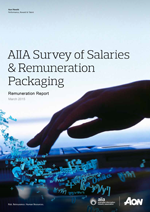
In good news for technology professionals, average salaries in the IT sector will continue to grow in 2020, but staff attrition rates will remain high unless companies implement strategies to extend the average tenure of employees.
Based on the latest biannual Aon Survey of Salaries & Remuneration Packaging Remuneration Report on the tech industry, the importance of retaining key staff members remains a focus for tech companies as they look to grow in the year ahead.
With January and February being one of the best times of the year to look for long-term, full-time employment, and the months where many companies receive updated budgets and sales forecasts – the release of this survey information is timely.

Outlook for salary growth
As organisations look to appropriately remunerate staff, the data produced in the Survey provides employers with critical information to make evidence-based, informed and data-driven decisions.
The Survey reports salaries in the industry have moved on average 2.9 per cent on Total Remuneration over the past 12 months, although there are wide variations by sector with software higher at 3.9 per cent. Early forecasts for 2020 expect salaries to grow at 2.5 per cent, a 0.4 per cent fall on the previous Report, indicating some conservatism given the tightening economic environment.
The Survey also found that the highest fixed pay increases have been observed in
product/research and development and graduate job families, with the lowest seen in the senior executive job family. In the latter, pay is more heavily performance oriented and therefore there is less pressure to bump fixed salaries.
With salaries for technology roles outperforming most industries, IT remains one of the highest remunerated sectors in Australia. Salary growth is expected to continue and will be largely driven by skill shortages, especially in areas such as data and software development, cyber security, and Artificial Intelligence (AI).
In new industries such as robotics, vehicle automation and cybersecurity, skill shortages will continue to be an issue.
Unsustainable staff attrition
High rates of staff attrition are a concern for the industry and employers should be focused on implementing strategies to extend the average tenure of their employees. Staff attrition (both voluntary and involuntary) is running at an unsustainably higher level of 21.7 per cent – on par with the attrition levels currently seen in Silicon Valley.
Whilst using pay to reduce attrition can be a quick fix, increasingly a broader focus on the employee value proposition including benefits, financial wellness and flexibility should be considered.
According to the Survey, the taxation environment around employee equity and ownership
schemes in Australia can be discouraging, although this is an area many companies are actively exploring to gain an edge and build employee commitment.
Skills in demand
The Survey found that over the past 24 months the technical skill sets with the greatest
supply/demand imbalance have been digital transformation/security/data science/AI and
DevOps.
There is emerging evidence that there is an improving supply of data scientists where
skills from other industries/professions can be retooled, supported by widespread reporting of the strong career prospects people in this area can enjoy, the Survey said.
As AI reshapes the economy it will create new industries and new jobs. According to the Government’s AI technology roadmap, digital technologies including AI will potentially be worth AU$315 billion to the Australian economy by 2028[1] and AI could be worth AU$22.17 trillion to the global economy by 2030.
The Australian information, communications and technology sector employees 663,000 workers in fields related to AI. Demand for specialists is strong and the number of people employed in this area is expected to grow to 758,700 by 2023, at a rate of 20,000 additional workers per year[2].
Software and applications programmers are likely to experience very strong future growth in salaries and lower unemployment compared to the overall labour market with an annual before-tax salary of $104,156 compared to the average non-tech related worker of $73,112[3].
As pay data from over 400 companies in Australia is included in the Report, it is highly relevant for human resources managers in the tech industry. Participating companies involved in the Survey include Accenture, IBM, Infosys Technologies, Canon, Australia Post, Data#3, DXC Technology, MYOB, Fujitsu, Nova Group, Envato, TechnologyOne, Toshiba, Telstra, Seven Consulting and Xero.
Staying informed of market movements is critical to ensure companies’ reward strategies are meeting business needs whilst minimising costs. The money spent on a remuneration report subscription can be made back many times over in savings through optimising total reward spend and retaining key talent. I urge technology companies to stay ahead of the curve as the employment market continues to change.
AIIA members receive a 50% discount by purchasing the AON Salary Survey. Order a copy of the Survey Report here.
For more information, please email: membership@aiia.com.au
Contact: Ron Gauci
Phone: 1300 665 145




